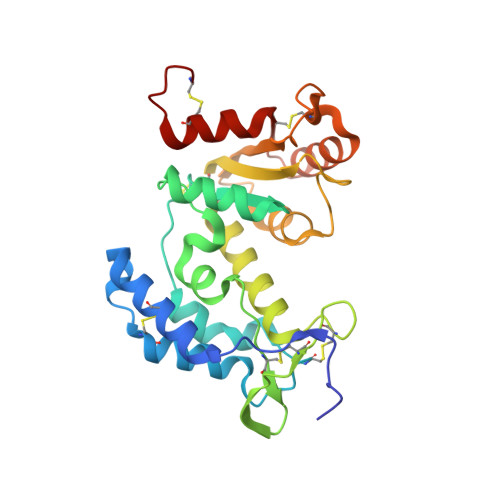Catalysis-based inhibitors of the calcium signaling function of CD38.
Kwong, A.K., Chen, Z., Zhang, H., Leung, F.P., Lam, C.M., Ting, K.Y., Zhang, L., Hao, Q., Zhang, L.H., Lee, H.C.(2012) Biochemistry 51: 555-564
- PubMed: 22142305
- DOI: https://doi.org/10.1021/bi201509f
- Primary Citation of Related Structures:
3ROK, 3ROM, 3ROP, 3ROQ - PubMed Abstract:
CD38 is a signaling enzyme responsible for catalyzing the synthesis of cyclic ADP ribose (cADPR) and nicotinic acid adenine dinucleotide phosphate; both are universal Ca(2+) messenger molecules. Ablation of the CD38 gene in mice causes multiple physiological defects, including impaired oxytocin release, that result in altered social behavior. A series of catalysis-based inhibitors of CD38 were designed and synthesized, starting with arabinosyl-2'-fluoro-2'-deoxynicotinamide mononucleotide. Structure-function relationships were analyzed to assess the structural determinants important for inhibiting the NADase activity of CD38. X-ray crystallography was used to reveal the covalent intermediates that were formed with the catalytic residue, Glu226. Metabolically stable analogues that were resistant to inactivation by phosphatase and esterase were synthesized and shown to be effective in inhibiting intracellular cADPR production in human HL-60 cells during induction of differentiation by retinoic acid. The inhibition was species-independent, and the analogues were similarly effective in blocking the cyclization reaction of CD38 in rat ventricular tissue extracts, as well as inhibiting the α-agonist-induced constriction in rat mesentery arteries. These compounds thus represent the first generally applicable and catalysis-based inhibitors of the Ca(2+) signaling function of CD38.
- Department of Physiology, 4/F Lab Block, University of Hong Kong, Hong Kong.
Organizational Affiliation:


















